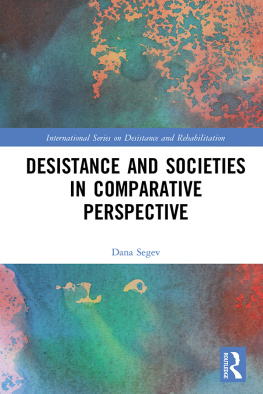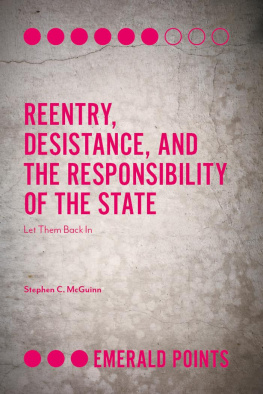We know crime is primarily a group activity, yet our justice system and our research models too often focus on criminal behaviour as the work of isolated individuals. In this fascinating study, Beth Weaver explores the life course trajectories of not just individuals, but an entire street gang that went straight. It is one of the most creative research designs I have seen in the past decade, and the stories that emerge are simply riveting.
Shadd Maruna, Dean, School of Criminal Justice, Rutgers University Newark, USA
This is an outstanding book. Through a blend of sophisticated theory and grounded analysis, Beth Weaver brings to life the complex journeys of six men as they attempt to extricate themselves (and each other) from multiple cycles of imprisonment and release. The in-depth and lucid accounts of how co-offenders might become co-desisters will surely stand as a unique and lasting contribution to the field of criminology and penology. Offending and Desistance offers, in short, an array of theoretical and practical challenges for anyone concerned with offender rehabilitation and reintegration.
Mark Halsey, Professor of Criminology, Centre for Crime Policy and Research, Flinders University, Australia
This book offers an innovative perspective on the process of desisting from crime, and is a must-read for scholars and practitioners interested in the underlying mechanisms associated with continuity and change in criminal behavior. Weaver focuses on members of a particular friendship group as they change their lives and relationships to one another, develop new concerns and social ties, and to varying degrees move away from earlier patterns of criminal involvement. Her analyses develop an elegant relational theory of desistance one that moves beyond simple notions of network influence (i.e. the role of bad companions, or good wives) on one hand or atomistic views of the change process on the other.
Peggy C. Giordano, Distinguished Professor of Sociology, Department of Sociology, Bowling Green State University, USA
This important and intriguing book is (strangely) the first to engage seriously with giving up crime as a shared social process, rather than as an individual one. Although, like all brilliant intellectual advances, this may sound obvious, thats only because we all should have thought of it before. Beth Weaver does a remarkable job of advancing our understanding of desistance, both through painstaking empirical work and through genuinely innovative theoretical work. Everyone interested in rehabilitation and desistance must read and re-read this text it is destined to become a classic.
Fergus McNeill, Professor of Criminology and Social Work, University of Glasgow, UK
Offending and Desistance
In Offending and Desistance, Beth Weaver examines the role of a co-offending peer group in shaping and influencing offending and desistance, focusing on three phases of their criminal careers: onset, persistence and desistance. While there is consensus across the body of desistance research that social relations have a role to play in variously constraining, enabling and sustaining desistance, no desistance studies have adequately analysed the dynamics or properties of social relations, or their relationship to individuals and social structures. This book aims to reset this balance.
By examining the social relations and life stories of six Scottish men (in their forties), Weaver reveals the central role of friendship groups, intimate relationships and families of formation, employment and religious communities. She shows how, for different individuals, these relations triggered reflexive evaluation of their priorities, behaviours and lifestyles, but with differing results.
Weavers re-examination of the relationships between structure, agency, identity and reflexivity in the desistance process ultimately illuminates new directions for research, policy and practice. This book is essential reading for academics and students engaged in the study of criminology and criminal justice, delinquency, probation and criminal law.
Beth Weaver is a Senior Lecturer in the Department of Social Work and Social Policy, University of Strathclyde. She is actively engaged in a number of research networks, research projects and knowledge exchange activities with specific interests in desistance, user involvement and co-production and the use of through-the-prison-gate social cooperative structures of employment. All of Beths research has an applied focus on penal reform.
International Series on Desistance and Rehabilitation
The International Series on Desistance and Rehabilitation aims to provide a forum for critical debate and discussion surrounding the topics of why people stop offending and how they can be more effectively reintegrated into the communities and societies from which they came. The books published in the series will be international in outlook, but tightly focused on the unique, specific contexts and processes associated with desistance, rehabilitation and reform. Each book in the series will stand as an attempt to advance knowledge or theorising about the topics at hand, rather than being merely an extended report of a specific research project. As such, it is anticipated that some of the books included in the series will be primarily theoretical, whilst others will be more tightly focused on the sorts of initiatives which could be employed to encourage desistance. It is not our intention that books published in the series be limited to the contemporary period, as good studies of desistance, rehabilitation and reform undertaken by historians of crime are also welcome. In terms of authorship, we would welcome excellent PhD work, as well as contributions from more established academics and research teams. Most books are expected to be monographs, but edited collections are also encouraged.
General Editor
Stephen Farrall, University of Sheffield
Editorial Board
- Ros Burnett, University of Oxford
- Thomas LeBel, University of Wisconsin-Milwaukee, USA
- Mark Halsey, Flinders University, Australia
- Fergus McNeill, Glasgow University
- Shadd Maruna, Queens University Belfast
- Gwen Robinson, Sheffield University
- Barry Godfrey, University of Liverpool
1The Dynamics of Desistance
Charting pathways through change
Deidre Healy
2Criminal Behaviour in Context
Space, place and desistance from crime
Nick Flynn
3Cultures of Desistance
Rehabilitation, reintegration and ethnic minorities
Adam Calverley
4Offender Rehabilitation and Therapeutic Communities
Enabling change the TC way
Alisa Stevens
5Desistance Transitions and the Impact of Probation
Sam King
6Black Men, Invisibility and Desistance from Crime
Towards a critical race theory of desistance
Martin Glynn
7White-Collar Offenders and Desistance from Crime
Future selves and the constancy of change
Ben Hunter
8Offending and Desistance
The importance of social relations
Beth Weaver





